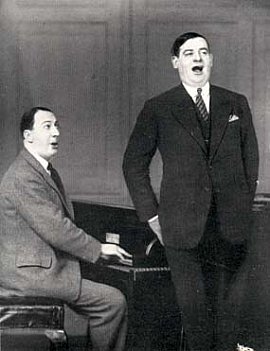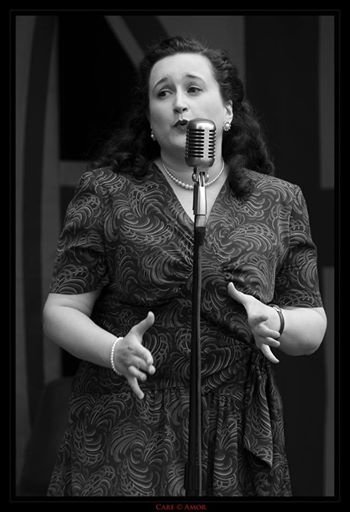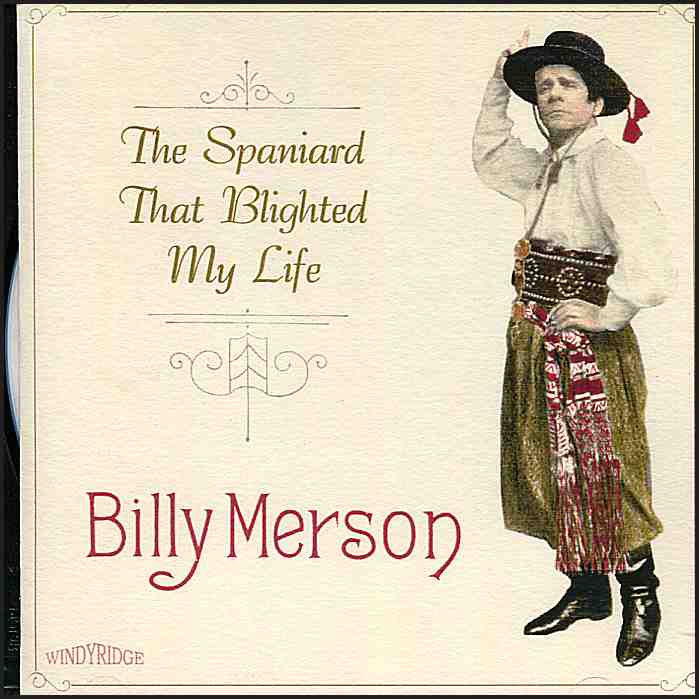
Especially for those whose Hogmanay celebrations have been called off due to an excess of wind:
Stop Yer Tickling Jock from Harry Lauder.

Especially for those whose Hogmanay celebrations have been called off due to an excess of wind:
Stop Yer Tickling Jock from Harry Lauder.
Meanwhile George Formby has been Letting the New Year in:
Heh Heh! Turned out nice again, ain't it! 🎶Plinky plink plonk🎵

Flotsam and Jetsam were an Anglo-Australian musical comedy duo of the 1920s and 1930s, sometimes considered a forerunner of Flanders and Swann.
Flotsam's real name was Bentley Collingwood Hilliam (1890-1968) and Jetsam's real name was Malcolm McEachern (1883-1945). Hilliam wrote most of their songs, played the piano and sang in a light, high tenor voice. By contrast, McEachern had one of the deepest bass voices on record.
Here they sing: Is 'e an Aussie, Lizzie, is 'e
and the somewhat disturbing wartime propaganda song The Londoner and the Hun
If anybody wants to experience the magic of the Music Hall, WOS Productions are putting on 2 performances on each of Saturday 24 May & Saturday 7 June this year in the Ickenham & Uxbridge area (both Ickenham & Uxbridge stations are on the Piccadilly & Metropolitan lines):
https://wos-productions.weebly.com/our-next-show.html


Dorrie Deane was born on 12 October 1889 in South Wigston, Leicestershire. Given the title "The Indescribable", she was described as having a spice of Ella Retford, a dash of Ethel Levey and, at times, a voice that is Clara Butt like. Her record company Vocalion said of her, "Miss Dene possesses the rare faculty of 'letting herself go' when recording and thus gets the whole of her humorous and forceful personality into both sides of the disc". She appeared in two short comedy films in 1931: Bull Rushes and Who Killed Doc Robin. She died on 4 February 1966 in Solihull.
She is best known fo the song Twiddling with the knobs on the radio:
www.youtube.com/watch?v=0E4TaNCEiRU
Here she is introduced by Ronald Frankau:
Quote: Billy Bunter @ 28th March 2025, 1:31 PMShe is best known fo the song Twiddling with the knobs on the radio:
Disgusting innuendo. Mind you she couldn't be seen doing it, and come back Max, all is forgiven

Born on this day (29 March) in 1879 in Nottingham as William Henry Thompson, Billy Merson was an English music hall performer, comedian and songwriter.
While working in a lace making factory in Nottingham, he performed in the evenings in a duo with Bernard Whiteman, at first as "Whiteman and Thompson - Irish Comedians and Trapeze Performers", and later as "Snakella and Travella". With Whiteman, he toured Ireland and the north of England, and appeared in pantomimes. In 1904, they changed their name to "Keith and Merson". Merson was initially an acrobat and clown and first played in London in 1905 under the character name "Ping-Pong". It was some time before he was able to make a living from his stage work. "For five or six years on the stage, I survived on a salary hardly enough to keep body and soul together", he said. The partnership with Whiteman ended in 1908.
Under the name Billy Merson, he then made his solo West End debut in 1909 and thereafter featured in a range of revues, pantomimes and other variety engagements. He wrote songs and sold some of his compositions to other performers, including Wilkie Bard and Harry Ford, before finding success with a song that he performed himself in pantomime, The Spaniard That Blighted My Life, sung in a pseudo-operatic style:
www.youtube.com/watch?v=zaijQz4FMIg
The song also became one of Al Jolson's first hits, in 1913, and a hit again when Jolson re-recorded it with Bing Crosby in 1947:
www.youtube.com/watch?v=2vADkbAmU80
Merson took Jolson to court over performing the song without authorisation but he lost on a technicality and the costs of the legal action left him bankrupt.
As a comedian he was often paired with George Formby Senior. He performed in revues, including Hullo America in 1918 with Elsie Janis, also featuring the London debut of Maurice Chevalier, who later wrote of Merson that he "was not only very funny, but he was fast on his feet as well and had a good baritone voice. This man had everything." He also appeared in Whirled into Happiness (1922), the operetta Rose-Marie in 1925, musical comedy, and plays. He was briefly chairman of the Music Hall at the Players Theatre in London. In the 1930s he reverted to his old music hall act, dressed in eccentric costume and singing. Other songs that Merson wrote include "The Photo of the Girl I Left Behind", and "Desdemonia".
He died in Nottigham on 25 June 1947 aged 68.
I remember the Spaniard on my Dad's Black and White Minstrel album.
This Wednesday (9 April) on Talking Pictures TV @ 10.05am: Tonight in Great Britain, a star studded short (and I do mean short - a 25 minute timeslot) film featuring Tessie O'Shea, Monsewer Eddie Gray and Max Bygraves at the London Palladium, Hattie Jacques at the Players' Theatre, Jean Carson at the Café de Paris and many more!
(This was before Don Revie signed Monswer Eddie Gray for Leeds United of course)
I think it is a repeat, as I'm sure I recently watched this on TPTV

The enduring song I Do Like to Be Beside the Seaside was written in 1907 by John H. Glover-Kind (1880 - 1918) and first made famous by music hall comedian & singer Mark Sheridan, who recorded it in 1909:
www.youtube.com/watch?v=OAlo1_ANtWo
It was composed at a time when annual visits to the seaside were booming and was later used as a signature tune by Reginald Dixon, who was the resident organist at the Tower Ballroom, Blackpool between 1930 and 1970 and who broadcast regularly from there on BBC radio.
Among many instances of its being used in popular culture, the song was featured in the films Bank Holiday (1938) starring Margaret Lockwood, The Adventures of Sherlock Holmes (1939) in which a heavily disguised Basil Rathbone sings the song, something of an anachronism really as the film was set in 1894, thirteen years before the song was written(!), Carry On Follow that Camel and Oh What a Lovely War. It was sung by Jon Pertwee in the Doctor Who episode Death to the Daleks and by the Goodies in the episode Holidays. It also features at the end of Queen's Seven Seas of Rhye.
Mark Sheridan himself (born Frederick Shaw in Sunderland on 11 September 1864)

often appeared on the same bill as the likes of Marie Lloyd, Little Tich, Dan Leno and George Robey. He recorded more than 50 songs over the years including
At the Football Match Last Saturday:
www.youtube.com/watch?v=YsUA6ucIaxo
and Belgium Put the Kibosh on the Kaiser (which also featured in Oh What a Lovely War):
www.youtube.com/watch?v=YsUA6ucIaxo
In 1917 he wrote and personally financed a musical burlesque show titled Gay Paree. It cost Sheridan £2,000 and had a company of 40 people, including two of his sons, Billy and Fred. It opened on 14 January 1918 at the Coliseum in Glasgow with Sheridan himself playing the part of Napoleon. However, the show received negative reviews from both audiences and critics and Sheridan's performance was considered by critics to be less successful than his earlier music hall performances. Devastated by the critics' reviews, Sheridan entered Kelvingrove Park, Glasgow on 15 January 1918 and killed himself with a single gunshot to the head, leaving behind his wife Maude, their three sons Billy, Fred and Jack, and their two daughters Frances and Freda.
He was buried in Cathcart Cemetery, East Renfrewshire on 18 January 1918, where he is commemorated by a pink granite gravestone:
